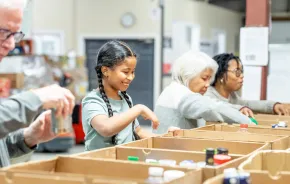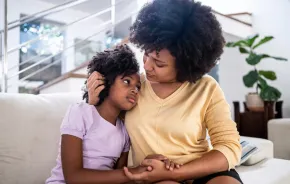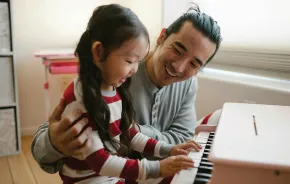 A chance encounter with then Seattle Schools Superintendent John Stanford 17 years ago turned out to be a life-changing event for Bernardo Ruiz. Ruiz, who was born in Mexico, was studying English and humanities at the University of Washington and contemplating a major in business. Stanford encouraged Ruiz to become a tutor. He did, and the impact he had as a mentor to a Latino first-grader spurred him on to work for Seattle Public Schools (SPS) as a bilingual instructional assistant. He moved up the ranks as a family advocate, a career coordinator, and the manager of school and family partnerships.
A chance encounter with then Seattle Schools Superintendent John Stanford 17 years ago turned out to be a life-changing event for Bernardo Ruiz. Ruiz, who was born in Mexico, was studying English and humanities at the University of Washington and contemplating a major in business. Stanford encouraged Ruiz to become a tutor. He did, and the impact he had as a mentor to a Latino first-grader spurred him on to work for Seattle Public Schools (SPS) as a bilingual instructional assistant. He moved up the ranks as a family advocate, a career coordinator, and the manager of school and family partnerships.
Now, as director of Equity and Race Relations, School & Family Partnerships and Native American Education for SPS, Ruiz reports directly to the superintendent. He has been nationally recognized for his efforts to strengthen school and community partnerships and is a sought-after speaker. In 2013, SPS received the Johns Hopkins University Partnership District Award for family and community engagement, in part because of its groundbreaking Family Connectors University training program, led by Ruiz.
How has your community engagement work on behalf of Seattle schools evolved?
When I started, we were a compliance department, and there was a lot of mistrust from families. Now, we’ve set up a strong foundation to build meaningful, strategic relations with families, who are our most important stakeholders and partners.
The district leadership has realized that supporting school-family partnerships is a viable strategy. Equity and family engagement are part of SPS’s strategic plan. We currently have family-engagement teams at 44 schools. This year, we will add 20 more, and the year after that, we will add 24.
Describe Family Connectors University.
The concept started because of partnerships we developed at Vanderbilt University and Johns Hopkins University. We discussed ways of building capacity for families. We knew they were eager to learn and wanted to be educated, so we re-created a family-engagement model that had been developed for special-education families in Florida.
It’s a free, 10-week program designed to build the capacity of families to serve as equal partners in the education of their children. They learn how the school system works and how to advocate for their children, and can earn college credit for the classes they attend. Upon graduation, participants serve as community volunteers for a minimum of one year.
We started in partnership with Seattle University with one cohort two years ago. Now we have three cohorts at Seattle University, six cohorts at North Seattle Community College and will offer three cohorts at the University of Washington this year.
The graduation ceremonies are powerful. People cry and talk about how the program has transformed their lives.
"Every day we meet with families, principals and teachers, and they renew my commitment that together we can build a better future for our children."
What else would you like Seattle Public Schools parents to know about community engagement?
One of our goals is to brand our work effectively so that more families are aware that we are there to serve everyone. Some families think that our programs are only for families of color.
I’m proud of our school-family engagement action teams, which focus on student achievement. They meet once a month and include school administrators, teachers, families, support staff, community partners and, at the high school level, students.
We’ve created a Family Engagement Action Team book of promising partnership practices [Ma3] that other schools can use. School action teams have created a number of programs to engage families to learn along with their kids.
Equity and family engagement are not add-ons; they are part of the work we do. You can’t be a good leader or teacher if you don’t engage families. I’m thankful to our families, principals, teachers, staff and school board for their commitment to family engagement. I’m also thankful to my wife for her support. I work long hours.
Do you ever get demoralized?
On a daily basis I talk to families who are upset and frustrated. But once we have the opportunity to have a discussion, they have renewed hope.
Every day we meet with families, principals and teachers, and they renew my commitment that together we can build a better future for our children. When families are engaged, research shows, there are fewer discipline problems, more mutual support, and teachers stay in the profession longer.
I’m more than optimistic — I’m hopeful. We could be a model school district in the nation. I am a man of faith. I thank God every day that I have the chance to change the world for 52,000 students and 30,000 families in our school district.











